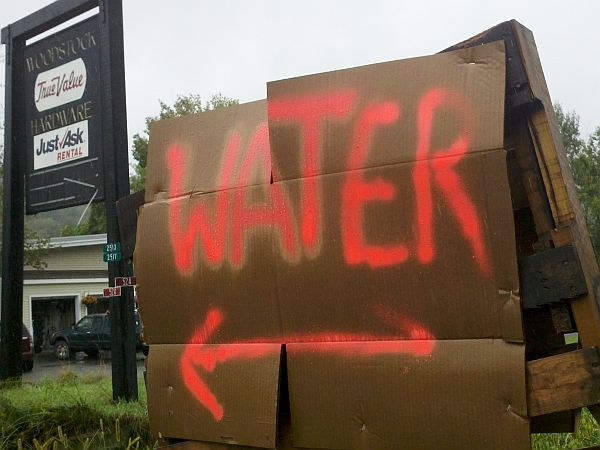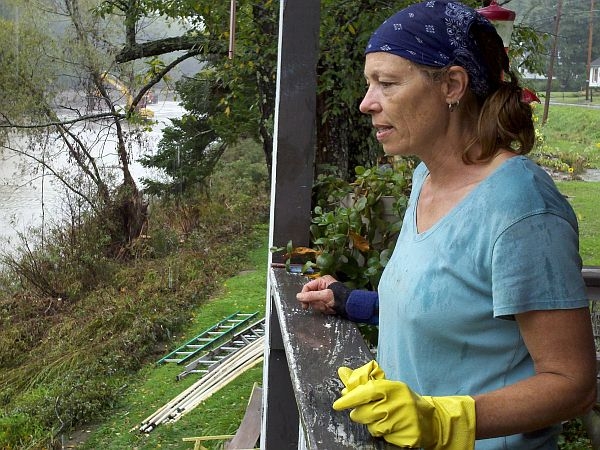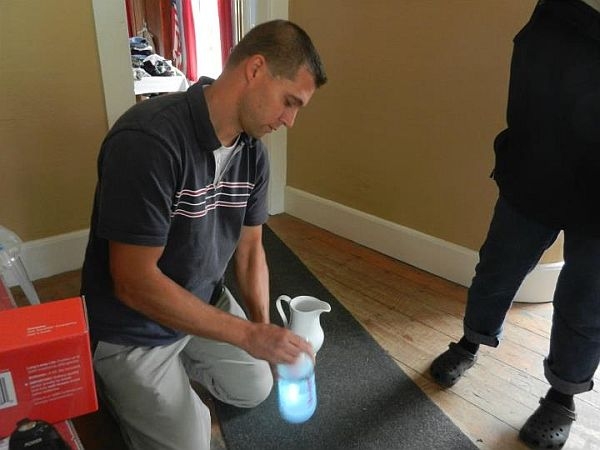 (Host) Homeowners in the flood zone whose wells or septic systems were inundated need to check the safety of their drinking water.
(Host) Homeowners in the flood zone whose wells or septic systems were inundated need to check the safety of their drinking water.
The Department of Health says it will test wells for free. And at least one group is offering a filter to help make water drinkable.
VPR’s Kirk Carapezza reports from Bridgewater Corners.
(Carapezza) Jody Pindt laughs now, but when Tropical Storm Irene ripped through this small hamlet last week she actually called Town Hall to see if it had sand bags. It didn’t.

(Pindt) "We watched all kinds of debris float down the river."
(Carapezza) Pindt stands on her back porch, and remembers how propane tanks rushed down the north branch of the Ottauquechee River through her backyard and into her barn.
(Prindt) "Trees, gigantic trees, were going sideways down the river with the root system still attached. Some were shooting down like torpedoes."
(Carapezza) Bridgewater was one of the communities along Routes 4 and 100 that Irene slapped especially hard.
Irene’s floodwaters swept away pieces of Bridgewater’s new bridge on Route 100A. Construction on that bridge was supposed to be completed this month.
But officials are particularly concerned now about drinking water supplies. The floodwaters overcame the town’s sewage treatment plant. Raw sewage flowed into the river, though no one knows exactly how much.
Jody Pindt’s well was covered by six feet of sewage-laden river water.
(Prindt) "When we took the well cap off we could tell that water had gotten in."
(Carapezza) The Natural Resources Agency says private wells that were flooded should be tested repeatedly for bacterial contamination. The agency says some wastewater systems will have to be repaired or even replaced. Until then, the agency says people in many of areas of the flood zone should filter and boil their water.
(Scott) "This will filter about two and half liters in two minutes."
(Carapezza) Inside the old Bridgewater Grange Hall, Scott Tommola shows some residents how to use a filter that can clean up water from their wells.
(Scott) "We’ll pour it into the reservoir."
(Carapezza) Tommola is a physical therapist from Rutland, which is just over the mountains from Bridgewater.

Last week, shocked by Irene’s devastation, Tommola launched a nonprofit called 802Relief. He’s asking people to buy and donate these filters so that he can distribute them to anyone in the flood zone who needs them.
Tommola worries that amid all the other problems Vermont faces in rebuilding clean water remains a secondary concern.
(Scott) "I think it’s almost an invisible crisis at this point. I think a lot of people are out there saying the power is coming back on. The well is working again. It’s pumping water again, and it’s coming out clear. Just because it’s clear doesn’t mean it’s safe to drink."
(Jody Pindt) "This stuff is so thick."
(Carapezza) Back at her barn, Jody Pindt says her first priority is digging herself out of all the muck that the river left on her property. Then she’ll focus on her drinking water.
(Pindt) "I am a little concerned, although we did shock the system with enough chlorine to have killed anything. But it is a little discolored."
(Carapezza) Pindt says she’ll be careful because she doesn’t have health insurance. So she’ll wait another month before drinking the water from her well.
For VPR News, I’m Kirk Carapezza